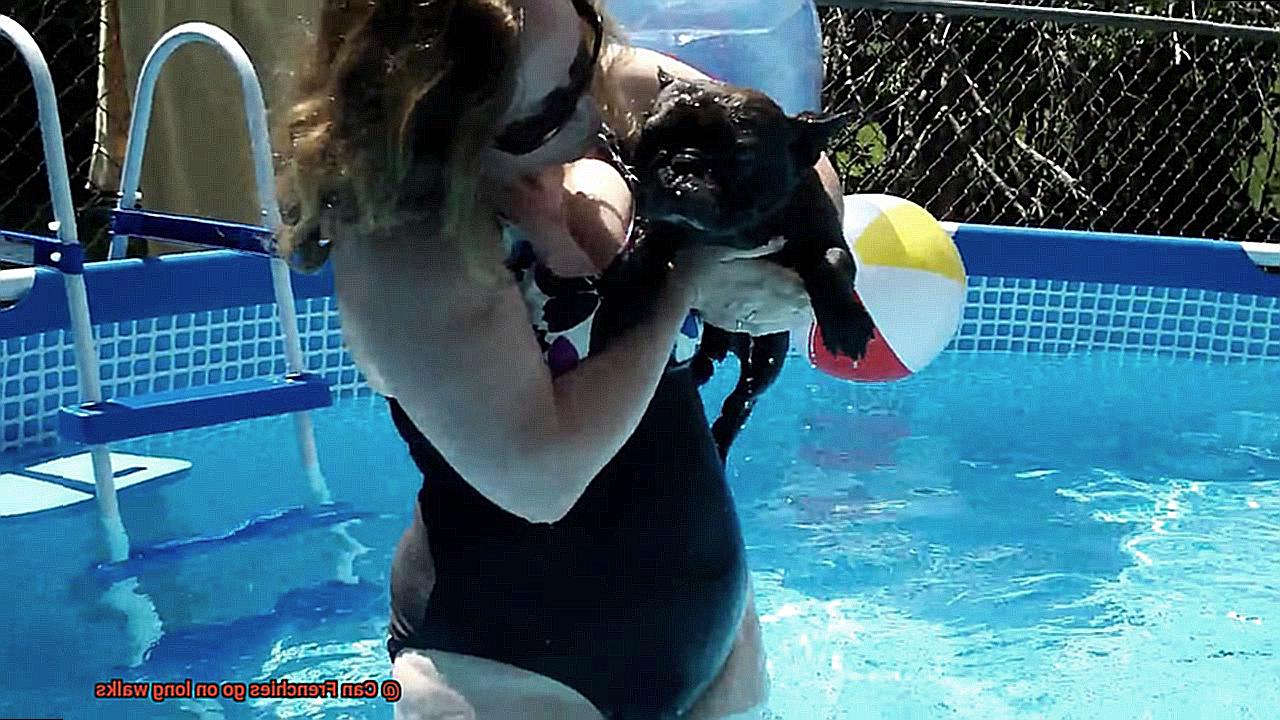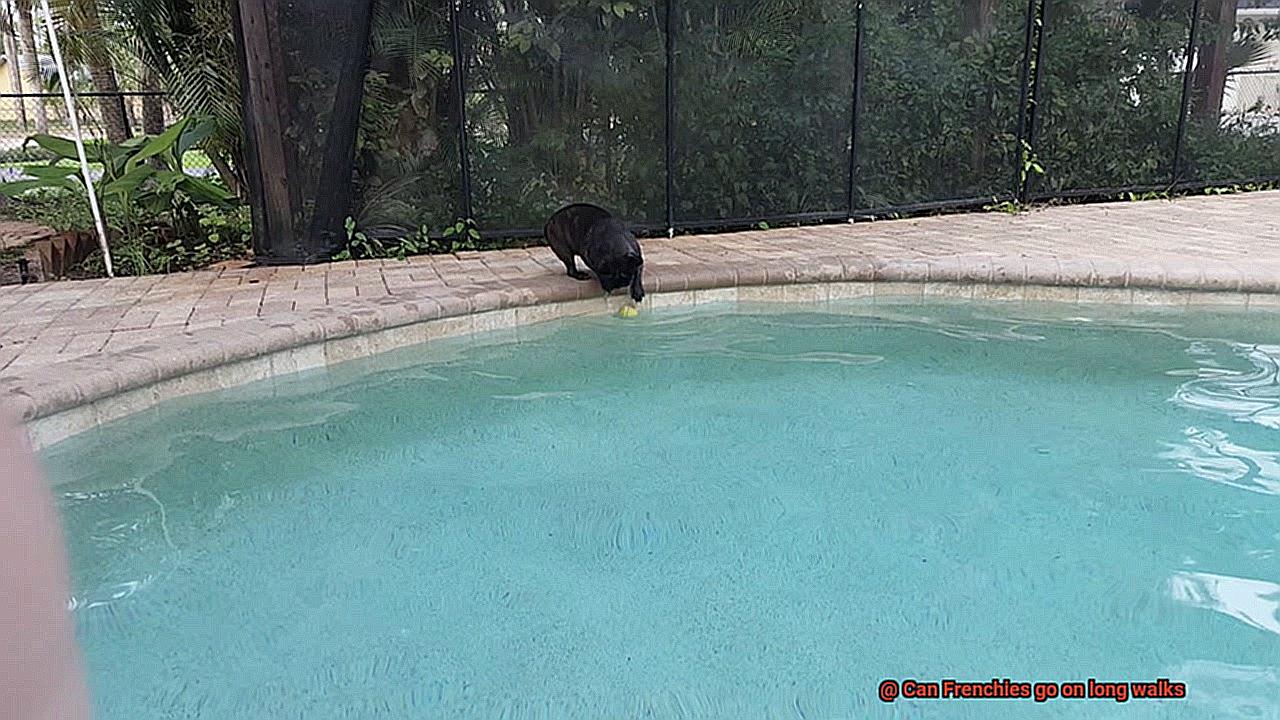Can Frenchies go on long walks?
French Bulldogs, or Frenchies as we lovingly call them, are a playful and charming breed. Don’t let their adorable squishy faces fool you though – these little companions are more than up for joining you on long walks. In fact, taking regular lengthy strolls can do wonders for their physical and mental health.
Physical Benefits:
Contents
- 1 The Physical Characteristics of French Bulldogs
- 2 Assessing Your Frenchie’s Health and Fitness Level
- 3 Weather Conditions to Consider When Walking a Frenchie
- 4 Choosing Appropriate Terrain for Your Frenchie’s Walk
- 5 Monitoring Your Frenchie’s Behavior During the Walk
- 6 Overexertion is Harmful to Your Frenchie’s Health
- 7 Individual Differences in Health, Age, and Fitness Levels
- 8 Tailoring Your Frenchie’s Exercise Regimen to Their Needs
- 9 Conclusion
Long walks give Frenchies a chance to burn off that excess energy and keep their weight in check. It’s like hitting the gym for them. Not only does it strengthen their muscles, but it also keeps their heart healthy and their joints flexible. Plus, by getting them moving, you’re helping prevent pesky issues like obesity.
Mental Stimulation:
But wait, there’s more. Long walks aren’t just about the physical benefits. They also provide vital mental stimulation for our curious little friends. Exploring new environments, sniffing out exciting scents, and meeting other furry pals all help keep those Frenchie minds engaged and entertained. And trust me when I say that a stimulated Frenchie is a happy Frenchie.
Potential Health Risks:
Now, before you go all-out on those long walks, it’s important to consider your Frenchie’s unique needs. Their short snouts mean they might struggle with intense exercise or hot weather. Overdoing it can lead to breathing difficulties, overheating, or plain old exhaustion. So be sure to keep an eye on their breathing and offer plenty of water breaks during your adventures together.
In conclusion, long walks are a fantastic way to keep your Frenchie fit both physically and mentally. Regular exercise helps maintain their overall well-being while preventing health problems that come with a sedentary lifestyle. Just remember to be mindful of potential risks and adjust the intensity and duration of your walks accordingly. So grab that leash, put on some comfy shoes, and get ready for amazing adventures with your Frenchie – keeping their health and happiness in mind every step of the way.
The Physical Characteristics of French Bulldogs
Due to their brachycephalic face and compact size, it’s important to approach their exercise needs with caution. In this blog post, we’ll explore the topic of taking French Bulldogs for walks and provide helpful tips to ensure a safe and enjoyable experience for both you and your furry friend.
Assess Your Frenchie’s Health and Fitness Level:
Before embarking on any physical activity, consult with your veterinarian to ensure your Frenchie is in good overall health. Discuss any specific concerns or limitations they may have, especially relating to respiratory issues or joint problems. This will help you determine the appropriate level of exercise for your Frenchie.
Be Mindful of Weather Conditions:
French Bulldogs are sensitive to extreme temperatures, particularly heat. Avoid walking during the hottest parts of the day and opt for cooler morning or evening hours instead. Keep in mind that hot pavement can also burn their paw pads, so choose shaded routes or invest in protective booties if needed.
Choose Suitable Terrain:
French Bulldogs are not built for strenuous exercise or rough terrains. Select paths that are relatively flat and free from obstacles to prevent unnecessary strain on their joints and muscles. Avoid steep inclines or uneven surfaces that could increase the risk of injury.
Watch for Physical Signs:
During the walk, closely monitor your Frenchie’s behavior and physical signs. Excessive panting, wheezing, or difficulty breathing are red flags that indicate your Frenchie may be overexerting themselves. Take immediate breaks, offer water, and allow them to rest before continuing.
Tailor Exercise to Individual Needs:
Remember that every Frenchie is unique, and their exercise needs may vary. Some French Bulldogs may have better endurance and tolerate longer walks, while others may require shorter, more frequent walks. Prioritize your Frenchie’s well-being over a set exercise routine and adjust accordingly.
Assessing Your Frenchie’s Health and Fitness Level
French Bulldogs, just like us humans, come in all shapes and sizes. And when it comes to taking them on long walks, it’s crucial to assess their health and fitness level before embarking on any adventurous journeys. Here are some key factors to consider:

- Age Ain’t Just a Number: Age plays a significant role in your Frenchie’s energy levels and stamina. Puppies tend to have boundless energy, but their young bones and joints are still developing. It’s important to gradually build up their endurance through shorter walks before tackling longer distances.
- Weight Woes: French Bulldogs have a tendency to pack on the pounds due to their love for food. But carrying excess weight can take a toll on their joints, making it challenging for them to keep up on long walks. Consult with your veterinarian to determine your Frenchie’s ideal weight range and adjust their diet accordingly.
- Breathing Blues: Frenchies are notorious for their respiratory problems, especially in hot or humid weather. Their adorable short snouts can make breathing difficult during intense physical activity. Be mindful of their breathing patterns and watch out for signs of distress, such as excessive panting or wheezing.
- Fitness Fanatics or Couch Potatoes: Assess your Frenchie’s overall activity level. Are they always bouncing off the walls and ready for playtime? Or do they tire easily and prefer snuggling on the couch? These factors can give you insight into their physical capabilities and determine if they’re up for long walks.
- Medical Matters: Any pre-existing medical conditions should also be taken into account. Hip dysplasia, arthritis, or other health issues may limit your Frenchie’s ability to engage in rigorous exercise. Consult with your vet to understand their specific health condition and what level of physical activity is suitable.
Weather Conditions to Consider When Walking a Frenchie
As a responsible French Bulldog owner, it is essential to consider various weather conditions before taking your furry friend out for a walk. Frenchies have specific needs and vulnerabilities due to their unique anatomy, making them more susceptible to certain weather-related issues. Let’s take a closer look at the weather conditions you should keep in mind when walking your Frenchie.
- Temperature: Hot weather can be particularly dangerous for French Bulldogs. Their shorter snout and narrower airways make it harder for them to regulate body temperature. Avoid walking your Frenchie during the hottest parts of the day, especially in summer. Opt for early morning or late evening walks when temperatures are cooler.
- Humidity: High humidity can be challenging for Frenchies as it hampers their ability to cool down through panting. Keep an eye on humidity levels and limit outdoor activities or shorten the duration of walks when humidity is high.
- Extreme Weather Conditions: French Bulldogs have a low tolerance for extreme weather conditions such as heavy rain, snowstorms, or strong winds. Protect your Frenchie from adverse elements by avoiding walks during severe weather. Wet weather can lead to soaked coats and potential health issues, while freezing temperatures without proper protection can cause hypothermia.
- Air Quality: Poor air quality, whether due to pollution or allergens, can exacerbate respiratory issues in French Bulldogs. If you live in an area with high pollution levels or during times when the air quality index is poor, it’s best to limit outdoor activities and opt for indoor exercises instead.

Remember, every Frenchie is unique, and their individual needs may vary. Pay attention to your dog’s behavior and signs of distress during walks. If your Frenchie is struggling or showing signs of discomfort, it’s best to cut the walk short and seek shade or air-conditioned areas.
Choosing Appropriate Terrain for Your Frenchie’s Walk
As a French Bulldog owner, you want to ensure that your furry friend stays healthy and happy. And one way to do that is by choosing the right terrain for their walks. French Bulldogs have a unique body structure and are prone to certain health issues, so it’s important to be mindful of the terrain they walk on. Let’s take a closer look at why choosing appropriate terrain is crucial for your Frenchie’s well-being.
- Body Structure: French Bulldogs have short legs and a compact body, which means they are not built for strenuous physical activities. Walking on uneven or challenging terrain can put excessive strain on their joints and lead to injuries. Choosing flat and even surfaces will help prevent any unnecessary stress on their bodies.
- Heat Sensitivity: French Bulldogs are sensitive to heat, especially due to their brachycephalic (short-nosed) structure. Walking on hot pavement or sand can burn their paws and cause discomfort. It’s important to choose terrain that stays cool, such as grass or dirt paths, to protect their sensitive paws from burns.
- Breathing Difficulties: French Bulldogs are also prone to breathing difficulties, particularly during exercise or in hot weather. Walking on steep hills or inclines can overexert them and exacerbate their respiratory issues. Opting for flat terrain will help prevent any unnecessary strain on their breathing.
- Joint Health: French Bulldogs are known to have joint problems, such as hip dysplasia. Walking on softer surfaces like grass or dirt can help cushion their joints and reduce the risk of injury or discomfort.
To summarize, choosing appropriate terrain for your Frenchie’s walk is crucial in ensuring their safety and well-being. Here’s a quick checklist to keep in mind:
- Choose flat and even surfaces
- Avoid hot pavement or sand
- Opt for grass or dirt paths
- Steer clear of steep hills or inclines
- Start with shorter walks and gradually increase duration
- Stay attentive to your Frenchie’s behavior
- Consult with your veterinarian before engaging in strenuous activities
Monitoring Your Frenchie’s Behavior During the Walk
Walking your Frenchie can be a paw-some bonding experience, but it’s important to keep a close eye on their behavior to ensure their safety and happiness. In this article, we’ll explore the significance of monitoring your Frenchie’s behavior during the walk and how to recognize signs of discomfort or pain. So grab your leash, put on your walking shoes, and let’s dive in.
Watch Their Breathing: Don’t Let Them Huff and Puff.
French Bulldogs have adorable short snouts, but this can sometimes make breathing a bit more challenging for them. Keep a keen eye on their breathing rate and effort. If you notice excessive panting or struggling to catch their breath, it’s time to take a breather. Shorten the walk or find a shady spot to rest until your Frenchie feels more comfortable.
Energy Levels: Know When to Take It Easy
Just like humans, our furry friends have different energy levels. Keep an eye out for signs of fatigue or lethargy during the walk. Is your Frenchie lagging behind, slowing down significantly, or taking frequent lie-down breaks? These are clear signals that it’s time to take it easy and give them a rest. Remember, walks should be enjoyable for both of you.
Decoding Body Language: What Are They Trying to Say?
Dogs communicate through body language, so it’s essential to pay attention to your Frenchie’s non-verbal cues during the walk. Look out for signs of discomfort or anxiety, such as excessive pulling on the leash, cowering, or trying to escape certain situations. If you notice these behaviors, take a moment to reassess the environment and make adjustments to make your Frenchie feel more at ease.

Social Interactions: Friends or Foes?
French Bulldogs are generally friendly and sociable, but they can have their moments of sensitivity. Keep an eye on how your Frenchie interacts with other dogs or strangers. Look out for signs of aggression, fear, or excessive excitement. If needed, provide positive reinforcement training to ensure their social interactions are happy and stress-free.
Pain Patrol: Listen to Their Whimpers
French Bulldogs are prone to certain health issues, so it’s essential to be attentive to any signs of discomfort or pain during the walk. Watch for limping, favoring one leg, or any indications that your Frenchie is in discomfort. If you spot these signs, consult your vet and adjust the walk accordingly to avoid exacerbating any underlying health problems.
Overexertion is Harmful to Your Frenchie’s Health
However, it is essential to understand the potential risks of overexertion on their health. As a brachycephalic breed, they have unique physical characteristics that make them more susceptible to respiratory issues and overheating. In this blog post, we will explore why overexertion can be harmful to your Frenchie’s health and provide practical tips to ensure their well-being during exercise.
Respiratory Issues and Difficulty Breathing:
French Bulldogs have shorter muzzles and flattened faces, which can lead to respiratory problems. Overexertion causes them to breathe rapidly, straining their already compromised airways. Excessive panting, wheezing, and struggling to catch their breath are signs of distress that should not be ignored.
Overheating and Exhaustion:
Frenchies are prone to overheating due to their brachycephalic features. They struggle to regulate body temperature efficiently, especially in hot weather or high humidity. Overexertion can quickly lead to exhaustion, increasing the risk of heatstroke and other heat-related illnesses.
Joint and Bone Stress:
Long walks or intense exercise sessions can put excessive stress on a Frenchie’s joints and bones. Their compact build makes them more susceptible to injuries and long-term damage. It is crucial to listen to your Frenchie’s cues for fatigue or discomfort and adjust the intensity and duration of exercise accordingly.
Tips for Safe Exercise:
To ensure your Frenchie’s safety during exercise:
- Keep walks shorter and slower, allowing for breaks and rest when needed.
- Choose the right time of day for walks, such as early mornings or evenings when the temperature is cooler.
- Provide plenty of water throughout the walk to prevent dehydration.
- Avoid walking on hot pavement, which can burn their sensitive paws.
- Tailor exercise to your Frenchie’s individual needs and abilities, considering their age, weight, and overall health condition.
- Consult with a veterinarian to determine the appropriate level of exercise for your Frenchie.

Individual Differences in Health, Age, and Fitness Levels
French Bulldogs are adorable and lovable companions, but their health, age, and fitness levels can greatly impact their ability to go on long walks. In this blog post, we will explore the individual differences in these factors and provide valuable insights to help you make informed decisions when planning walks with your French Bulldog.
Health Factors:
- Respiratory Issues: French Bulldogs are brachycephalic breeds, which means they have shorter snouts. This anatomical feature often leads to respiratory difficulties, especially during physical exertion. It is crucial to monitor your Frenchie’s breathing during walks and avoid overexertion that could potentially cause distress.
- Joint Problems: Some French Bulldogs may be prone to joint issues such as hip dysplasia or luxating patellas. These conditions can cause discomfort and limit their mobility, making long walks challenging. Regular visits to the veterinarian will help identify any underlying joint problems and determine suitable exercise regimens for your Frenchie.
Age Considerations:
- Puppies: Young French Bulldogs have developing bones and muscles that are more susceptible to injury from excessive exercise. While short walks are beneficial for their growth and socialization, it is crucial to avoid prolonged or intense physical activities until they reach appropriate maturity.
- Senior French Bulldogs: As our furry friends age, they may experience reduced mobility and age-related issues like arthritis. Adjusting the duration and intensity of walks becomes essential to ensure their comfort and prevent unnecessary strain on their joints.
Fitness Levels:
- Natural Activity Levels: Just like humans, French Bulldogs have varying energy levels and natural tendencies towards activity or relaxation. Some Frenchies may thrive on longer walks, while others prefer shorter bursts of exercise. Understanding your Frenchie’s natural inclination towards physical activity will help you tailor their exercise routines to suit their individual needs.
- Gradual Exercise Increase: If your Frenchie is less active or has been sedentary for a while, it is important to build up their fitness gradually. Start with shorter walks and gradually increase the duration and intensity over time. This approach allows their bodies to adapt and prevents overexertion or injury.
Tailoring Your Frenchie’s Exercise Regimen to Their Needs
French Bulldogs, with their adorable squished faces and compact bodies, may not seem like the most active breed. But don’t be fooled – these little guys still need regular exercise to keep them happy and healthy. However, due to their unique anatomy and potential health issues, it’s essential to tailor their exercise regimen to their individual needs.
Understanding Their Brachycephalic Build
French Bulldogs are brachycephalic, which means they have a shortened skull and narrowed airways. This can make it more challenging for them to breathe, especially during exercise. It’s crucial to choose activities that won’t put too much strain on their respiratory system.
Low-Impact Activities for Frenchies
When it comes to exercise, low-impact activities are your Frenchie’s best friend. These activities are less strenuous on their joints and respiratory system, reducing the risk of injury or breathing difficulties. Here are some ideas:

- Short Walks: Instead of long hikes, opt for shorter walks around the neighborhood. Keep an eye on your Frenchie’s breathing and energy levels – if they start panting excessively or seem tired, it’s time to head back home.
- Gentle Play Sessions: Engaging in gentle play sessions with your Frenchie can provide mental stimulation and physical activity without putting too much strain on their body. Play fetch with soft toys or let them chase bubbles in the backyard.
- Swimming: If you have access to a pool or a safe body of water, swimming can be an excellent low-impact exercise for French Bulldogs. It provides a full-body workout without putting stress on their joints.
Listen to Your Frenchie’s Cues
During exercise, pay close attention to your Frenchie’s cues. If they start panting excessively, struggling to breathe, or showing signs of fatigue, it’s essential to stop and give them a break. Pushing them too hard can lead to overheating or breathing difficulties.
Consider Age and Overall Health
Another crucial aspect of tailoring your Frenchie’s exercise regimen is considering their age and overall health. Puppies may have more energy and require shorter bursts of exercise throughout the day, while older Frenchies may need more rest and gentle activities.
Weather Considerations
French Bulldogs are sensitive to extreme temperatures, so it’s best to avoid exercising them during the hottest parts of the day or in freezing conditions. On hot days, opt for early morning or late evening walks when it’s cooler outside.
Mental Stimulation Is Key
Exercise isn’t just about physical activity – mental stimulation is equally important for French Bulldogs. Incorporate interactive toys, puzzle games, and training sessions into their routine to keep their minds engaged and prevent boredom.
iMpXeyX8VT4″ >
Conclusion
In conclusion, French Bulldogs are indeed capable of going on long walks. Despite their small stature and brachycephalic (short-nosed) features, these adorable pups have surprising endurance and love exploring the great outdoors. With proper training, gradual conditioning, and consideration for their unique needs, Frenchies can happily accompany you on your adventures.
So don’t let their cute wrinkly faces fool you – French Bulldogs are more than just couch potatoes. They may not be the fastest or most agile breed, but they make up for it with their enthusiasm and determination. Just remember to take frequent breaks, provide plenty of water, and avoid strenuous activities in extreme weather conditions.
Whether it’s a leisurely stroll through the park or a challenging hike up a mountain trail, Frenchies can handle it if given the opportunity. So grab that leash, put on your walking shoes, and embark on unforgettable journeys with your furry companion by your side.
In summary, French Bulldogs are not only suitable for long walks but can thrive in such activities when properly prepared and cared for.




